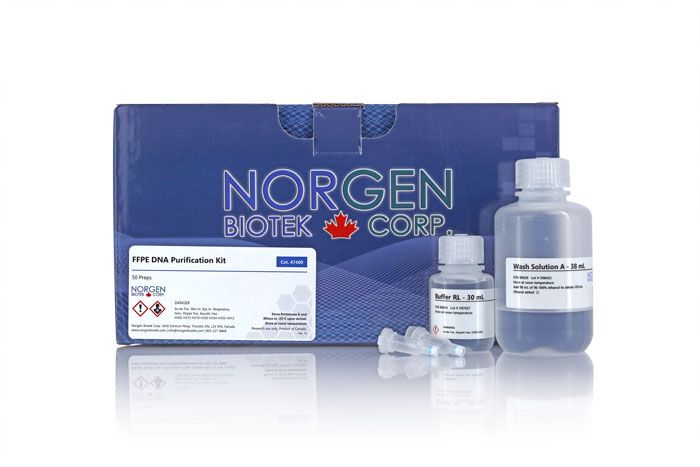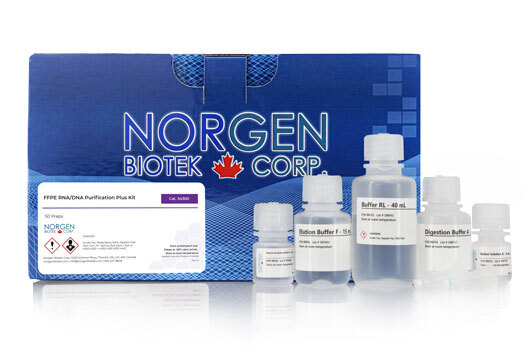FFPE DNA Purification Kit
For the rapid and efficient extraction and purification of DNA from FFPE samples

For research use only and NOT intended for in vitro diagnostics.
CE-IVDR marked diagnostic version available here
FFPE DNA Purification Kit
For the rapid and efficient extraction and purification of DNA from FFPE samples
Register today to receive an exclusive 15% off* on your first order.
Features and Benefits
- Fast and easy processing using rapid and convenient spin-columns
- Isolate high quality and high yield DNA
- DNA is free of inhibitors and ready for downstream use including SNP (single nucleotide polymorphism) and short-tandem repeat (STR) genotyping
This kit provides a rapid method for the isolation and purification of DNA from formalin-fixed paraffin-embedded (FFPE) tissue samples. Using formalin to fix tissues leads to crosslinking of the nucleic acids and proteins, and the process of embedding the tissue samples can also lead to fragmentation of the nucleic acids over time. Norgen’s FFPE DNA Purification Kit provides conditions that allow for the partial reversing of the formalin modifications, resulting in a high quality and yield of nucleic acids. The purified DNA is of high yield and integrity and is free of inhibitors, ready for use in a number of downstream applications including qPCR, mutation screening, microarray analysis, sequencing, single nucleotide polymorphism (SNP) and short-tandem repeat (STR) genotyping. The protocol can be completed in as little as 1 hour.
Details
Supporting Data
Figure 1. Comparison of Total DNA Yield Isolated by Norgen's FFPE DNA Kit and a Leading Competitor FFPE DNA Purification Kit. DNA was isolated from 10 mg of FFPE kidney blocks. DNA concentrations were measured using the NanoVue spectrophotometer (GE Healthcare). Norgen's kit was found to have a much higher DNA yield, compared to the competitor kit.
Figure 2. Comparison of DNA Quality Isolated by Norgen's FFPE DNA Kit and a Leading Competitor FFPE DNA Purification Kit. DNA was isolated from 10 mg of FFPE kidney blocks. Quality was assessed using A260:A280 and A260:A230 ratios generated from the NanoVue spectrophotometer (GE Healthcare). While Norgen and the competitor kit were found to have similar A260:A280 ratios, Norgen was found to have a much higher A260:A230 ratio, indicating higher quality DNA.
Figure 3. Comparison of qPCR Performance from FFPE DNA Isolated by Norgen's FFPE DNA Kit and a Leading Competitor FFPE DNA Purification Kit. Total DNA was isolated from 10 mg of FFPE kidney blocks, in triplicate. A qPCR reaction was performed using 500 ng of purified DNA in a 2 µL reaction, using Norgen's 2x qPCR Mastermix (Cat# 28007) spiked with SYBR Green (Bio-Rad). The reaction took place in the iCycler iQ™Real-Time PCR Detection System (Bio-Rad), using beta-actin primers. The graph depicts the average Ct value generated from DNA isolated from both kits. Norgen and the leading competitor were found to isolate DNA from FFPE tissues with the highest quality, performing similarly in a qPCR reaction.
Figure 4. Comparison of DNA molecular weight range isolated by Norgen's FFPE DNA Kit and a Leading Competitor FFPE DNA Purification Kits. DNA was isolated from 10 mg of FFPE kidney blocks. Based on the intensity of the bands, Norgen's kit captured more total DNA. Moreover, the DNA isolated by Norgen's kit covered a larger MW size compared with that isolated by the competitor kit. Both very high molecular DNA (intact genomic DNA, black arrow) as well as small molecular weight DNA were recovered. M = Norgen's HighRanger Molecular Weight Ladder.
|
Kit Specifications
|
|
|
Maximum Column Binding Capacity (gDNA)
|
10 μg
|
| Maximum Loading Volume Per Spin Column |
650 μL
|
| Size of DNA Purified |
All sizes > 80 bp
|
| Maximum Amount of Starting Material |
5 sections < 20 µm thick paraffin slices
25 mg of unsectioned block |
Storage Conditions and Product Stability
All solutions should be kept tightly sealed and stored at room temperature. The Proteinase K should be stored at -20°C upon arrival and after reconstitution. This kit is stable for 1 year after the date of shipment.
Component | Cat. 47400 (50 preps) |
|---|---|
Digestion Buffer A | 25 mL |
Buffer RL | 30 mL |
Wash Solution A | 38 mL |
Elution Buffer B | 15 mL |
Proteinase K | 12 mg |
RNase A | 1 tube |
gDNA Purification Micro Columns | 50 |
Collection Tubes | 50 |
Elution Tubes (1.7 mL) | 50 |
Product Insert | 1 |
Documentation
FAQs
Spin Column
Poor DNA recovery could be due to one or more of the following:
- Incomplete lysis of cells or tissue.
Ensure that the appropriate amount of Digestion Buffer A with Proteinase K added was used. Increase the incubation time. - Column has become clogged.
Do not exceed the recommended amounts of starting materials. The amount of starting material may need to be decreased if the column shows clogging below the recommended levels. See FAQ related to “Clogged Column” below. - An alternative elution solution was used.
It is recommended that the Elution Buffer B supplied with this kit be used for maximum DNA recovery. - Ethanol or Buffer RL was not added to the lysate.
Ensure that the appropriate amount of ethanol and Buffer RL is added to the lysate before binding to the column. - Ethanol was not added to the Wash Solution A.
Ensure that 90 mL of 96 – 100 % ethanol is added to the supplied Wash Solution A prior to use. - Low DNA content in cells or tissues used.
Different tissues and cells have different DNA contents, and thus the expected yield of DNA will vary greatly from these different sources. Please check literature to determine the expected DNA content of your starting material.
Column clogging can result from the following:
- Insufficient solubilization of cells or tissues.
Ensure that the appropriate amount of lysis buffer was used for the amount of cells or tissue. - Maximum number of cells or amount of tissue exceeds kit specifications.
Refer to specifications to determine if the amount of starting material falls within kit specifications. - Clarified lysate was not used for the binding step.
Ensure that after the lysis step the sample is centrifuged if a significant amount of debris is present, and that only the clarified lysate is used in subsequent steps. - Centrifuge temperature is too low.
Ensure that the centrifuge remains at room temperature throughout the procedure. Temperatures below 15°C may cause precipitates to form that can cause the columns to clog.
RNA can be degraded due to the following factors:
- FFPE sample is old.
The quality of RNA purified may drastically decrease in old samples. For best performance, freshly prepared samples are highly recommended. - RNase contamination.
RNases may be introduced during the use of the kit. Ensure proper procedures are followed when working with RNA. Please refer to “Working with RNA” at the beginning of this user guide. - Procedure not performed quickly enough.
In order to maintain the integrity of the RNA, it is important that the procedure be performed quickly. This is especially important for the Cell Lysate Preparation Step in the Animal Tissue protocol, since the RNA in animal tissues is not protected after harvesting until it is disrupted and homogenized. - Improper storage of the purified RNA.
For short term storage, RNA samples may be stored at –20°C for a few days. It is recommended that samples be stored at –70°C for longer term storage. - Prolonged incubation at 80°C.
In order to reverse formalin cross-links, an incubation at 80°C is required. Do not exceed 15 minutes of incubation at 80°C as this will increase RNA fragmentation. - Starting material may have a high RNase content.
For starting materials with high RNase content, it is recommended that β-mercaptoethanol be added to the Buffer RL.
If the RNA does not perform well in downstream applications, it may be due to one or more of the following:
- RNA was not washed 3 times with the provided Wash Solution A.
Traces of salt from the binding step may remain in the sample if the well is not washed 3 times with Wash Solution A. Salt may interfere with downstream applications, and thus must be washed from the well. - Ethanol carryover.
Ensure that the dry spin under the Well Wash procedure is performed, in order to remove traces of ethanol prior to elution. Ethanol is known to interfere with many downstream applications. - Formalin crosslink was not completely reversed.
Ensure the sufficient incubation at 80°C is performed in Step 2b of the protocol. Do not exceed 15 minutes of incubation at 80°C as this will increase RNA fragmentation.
Citations
| Title | Effect of the 16S rRNA Gene Hypervariable Region on the Microbiome Taxonomic Profile and Diversity in the Endangered Fish Totoaba macdonaldi |
| Citation | Microorganisms 2024. |
| Authors | Itzel Soledad Pérez-Bustamante 1,Roberto Cruz-Flores 1,*,Jesús Antonio López-Carvallo 2ORCID andSamuel Sánchez-Serrano |
| Title | Gradient inflammation in the pancreatic stump after pancreaticoduodenectomy: Two case reports and review of literature |
| Citation | World Journal of Clinical Cases 2024. |
| Authors | Tie-Gong Wang, Liang Tian, Xiao-Ling Zhang, Lei Zhang, Xiu-Lei Zhao, De-Shuai Kong |
| Title | Tracking the emergence of a novel genotype of Decapod hepanhamaparvovirus in shrimp using laser microdissection and next generation sequencing |
| Citation | PLOS ONE 2024. |
| Authors | Roberto Cruz-Flores,Arun K. Dhar |
| Title | A Study of Platelet-Derived Growth Factor A and Its Ligand among Patients with Glioblastoma and Astrocytoma in Imam Khomeini Hospital Complex, Tehran |
| Citation | J Adv Med Biomed Res 2023. |
| Authors | Fateme Behrouzi Pouya, Mojtaba Saffari, Ahad Muhammadnejad, Maryam Monsef Shokri, Reza Shirkoohi |
| Title | Detection of a novel microsporidium with intranuclear localization in farmed Penaeus vannamei from Latin America |
| Citation | Journal of Invertebrate Pathology 2023. |
| Authors | Arun K. Dhar, Roberto Cruz-Flores, Hung N. Mai, Luis Fernando Aranguren Caro, Pablo Intriago, Xavier Romero |
| Title | Detection of Low-Risk and High-Risk Oncogenic Human Papillomavirus in Archived Tissues from ENT Tumors in Burkina Faso |
| Citation | Journal of Biosciences and Medicines 2023. |
| Authors | Kandé, Ali, Maïmouna Ilboudo, Djénéba Ouermi, Ina Marie Angèle Traore, Abdoul Karim Ouattara, Théodora Mahoukèdè Zohoncon, Esther Mah Alima Traore et al. |
| Title | Molecular Epidemiology of High-Risk Human Papillomavirus in High-Grade Cervical Intraepithelial Neoplasia and in Cervical Cancer in Parakou, Republic of Benin |
| Citation | Pakistan Journal of Biological Sciences 2016. |
| Authors | T.M. Zohoncon, 1,2T.C. Ouédraogo, 3,4L.V.C. Brun, 8 D. Obiri-Yeboah, 1,2W.F. Djigma, 5 S. Kabibou, 6 S. Ouattara, 3 M. Gomina, 1,2A.T. Yonli, 1,2V.J.T.E. Bazié, 2,6C. Ouédraogo, 6 O. Lompo, 2,3S.A. Akpona and 1,2,7J. Simpore |

